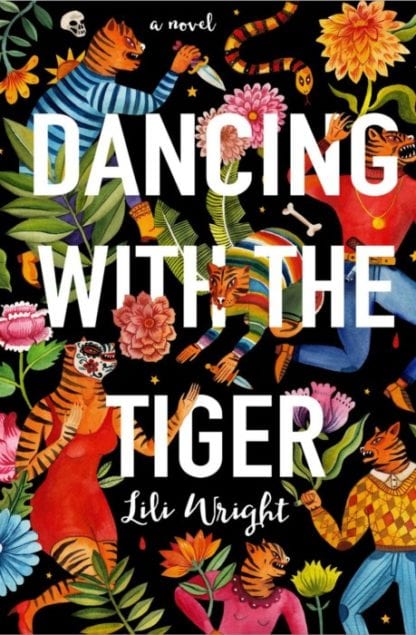From Lili Wright, a remarkable new voice in American fiction, comes a compelling, propulsive, and wholly original debut, Dancing With
The Tiger (Marian Wood Books/Putnam; July 12, 2016).
A stunning literary thriller set against Mexico’s epidemic of drug violence and the global controversy over the repatriation of cultural artifacts, the novel marks the arrival of a major literary talent.
Powerfully plotted and set in a too often brutal and corrupt land, Dancing With The Tiger is, as Sheri Holman (The Dress Lodger) says, “as hallucinatory and revelatory as a shot of mescal.”
It begins when a meth-addicted grave robber unearths what he is sure is a priceless artifact: the death mask of Montezuma, the fabled Aztec ruler. Though the looter is in the pay of a vicious drug lord who also is an ambitious collector of ancient artifacts, he decides to steal the mask, thereby setting off a violent struggle for its possession that pulls in a richly varied cast of Mexicans and American expats.
There’s the ruthless, dying drug lord who will stop at nothing to secure the death mask for himself; the secretive expat American collector for whom masks are almost a fetish, kept locked away in a private chapel on his property; the Mexican gardener who needs cash to escape with his teenaged lover; the former Oaxacan museum director who, for a fee, provides provenances for looted artifacts; his long-suffering housekeeper, deeply religious, a lesbian in a culture of machismo who despises her patron; Salvador, the sensual and mercurial Oaxacan painter with a secret agenda of his own, and the addled, meth-addicted American grave robber himself, in over his head and running for his life.
Above all, there’s the novel’s heroine, Anna Ramsay, a 30-year-old American with a history of bad choices for whom the mask means redemption for her father, a discredited art collector, and retribution against her unfaithful fiancé, a museum curator — and perhaps also the recovery of an identity that shriveled after her mother’s traumatic early death. Written in taut, lyrical prose, Dancing With The Tiger is a riveting exploration of the masks we wear, the secrets we keep, and the revelations we owe to those we love.
Debut novelist Lili Wright has a deep understanding of Mexico’s cultural, religious, and social paradoxes and complexities. During her many trips to Mexico, including a year in Oaxaca, she lived with Mexican families, studied Spanish, worked as a reporter, watched dancing tigers parade down the streets, visited ghost towns, and started her own mask collection.
As editor Marian Wood writes: “Lili Wright is that rare American who has thrown off the carapace of privilege to get to the heart and soul of this bedeviled country.”
By turns seductive, tense, and even terrifying, Dancing With The Tiger is a novel for our time, a time of vast inequalities and mindless murder. But it is also a novel about redemption and a powerful reminder that masks, both literal and metaphoric — the ones we wear to hide ourselves in plain sight and to disguise the pain we feel — are as universal as our desire for transformation.
A graduate of Brown University, Lili Wright spent a decade as a journalist before earning her MFA in nonfiction from Columbia University. Her nonfiction has appeared in The New York Times, Newsweek, Chicago Tribune, Baltimore Sun, and New York Post. She is the author of Learning to Float, a travel memoir about a trip from Maine to Key West, which was included on The Washington Post’s best summer reads list. She currently teaches creative writing and journalism at DePauw University in Indiana, where she lives with her husband and two children.
Lili Wright will be speaking about her new novel at Books & Books, 265 Aragon Ave. in Coral Gables, on Sunday, July 17, at 4 p.m.








